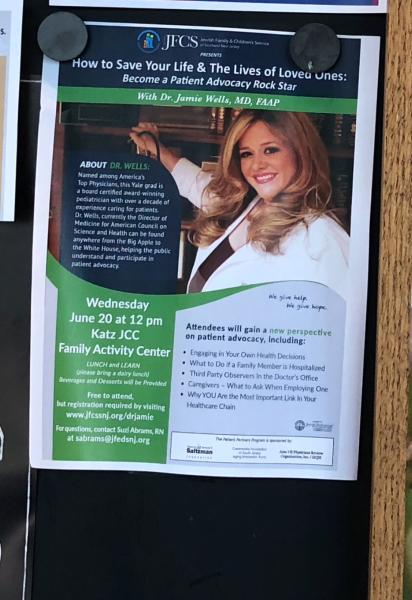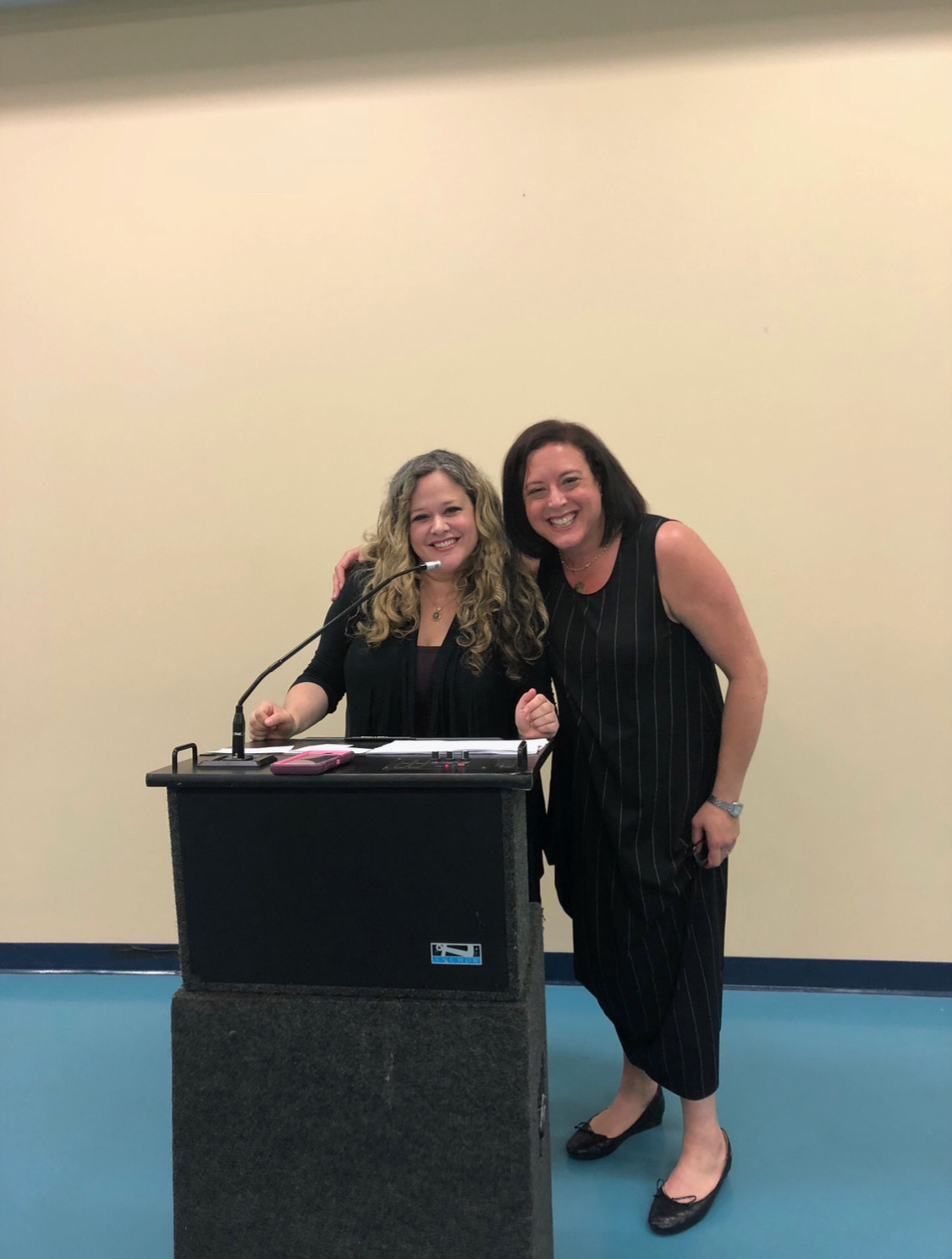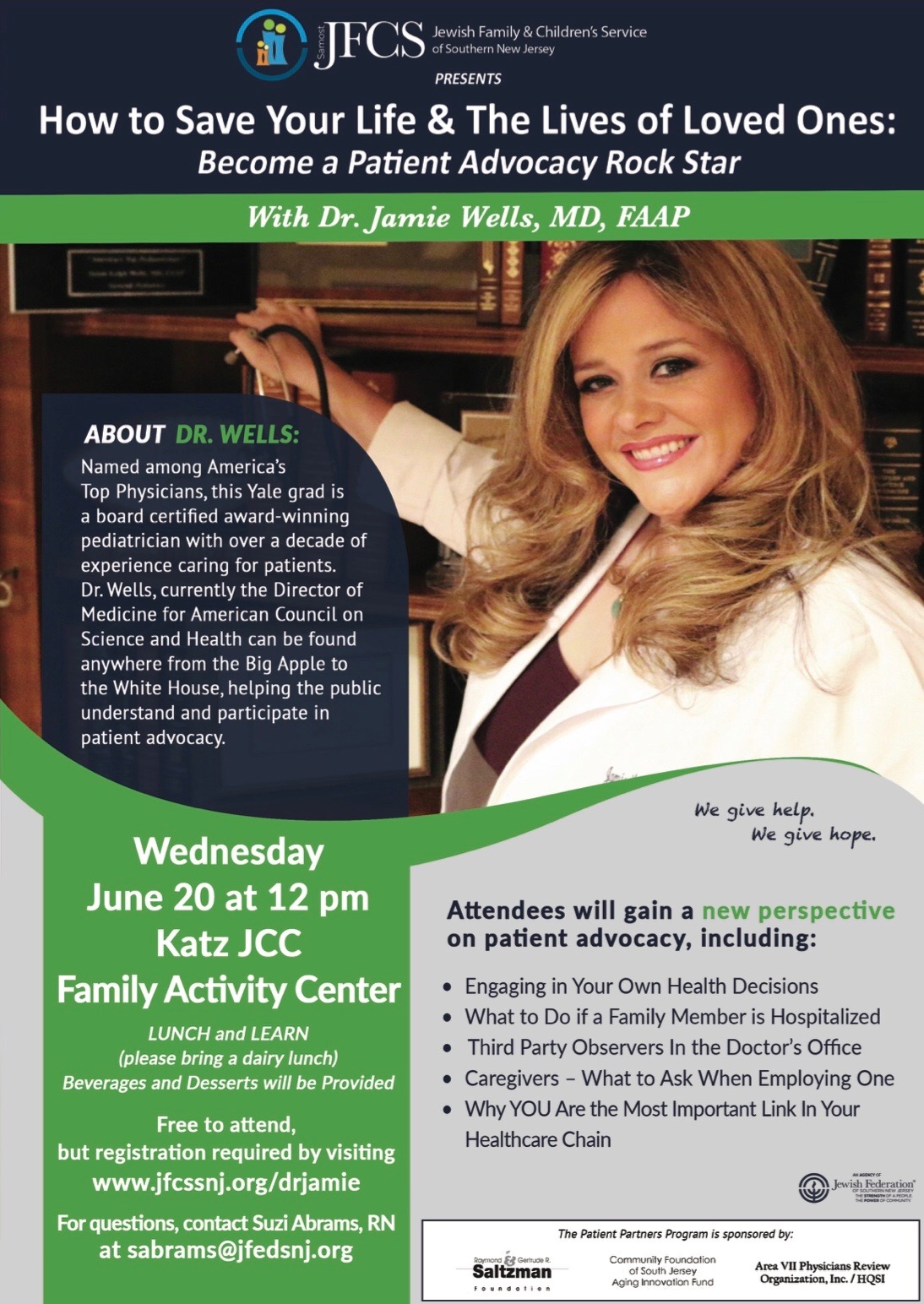
It was such a privilege and honor for me to be invited by the incomparable Suzi Abrams and Jewish Family & Children’s Services of Southern New Jersey to present on how to be an advocate for yourself or a loved one in the medical realm. To inform from a physician's perspective, I put together a guide on the subject that can be found by scrolling down in this article. The topic of patient advocacy is very close to my heart, so when I was invited to speak by someone I deeply admire who runs an effective, successful program the community vitally needs, it was a no-brainer. By training volunteers to be advocates for seniors, Patient Partners - led by Abrams (pictured here with me), a seasoned nurse and program coordinator - not only empowers them, but also tangibly achieves greater compliance, reduced hospitalization and readmission rates.
And, this, quells suffering.

It isn’t always possible to prevent or overcome an ominous diagnosis, but eliminating unnecessary worry, pain, anguish and avoidable complications should be within our grasp. Preventable medical error and unintentional injury is additive to the trauma of chronic disease, not only to the patient but also to his loved ones. By shifting an emphasis toward the things we can control and decreasing barriers that impede optimal care delivery, we minimize arbitrary discomfort, irreparable harm and embolden resilience and favorable outcomes - while also paying greater dividends in healthcare savings.
The current changing medical landscape makes putting your head in the sand a particularly risky endeavor. With a constant surge of competing profit centers fragmenting healthcare, more layers than ever are in place eroding the doctor-patient relationship. Hopefully, you will leave this talk understanding how this diminishes care quality while acquiring tools to optimize continuity, a proven factor in delivering better outcomes.
The Problems
The disconnect and gap between health policy and practice is ever widening with almost 1 in 5 U.S. physicians planning to reduce their clinical hours in the coming year and nearly 1 in 50 expecting to leave the field entirely in the next 2 years to focus on a different career. Electronic medical records (EMRs) have not lived up to their promise and fractured care further. As glorified billing platforms that contain endless extraneous data that has no use in diagnostic or treatment decisions, they have managed to erode the doctor-patient relationship, distract attention away from patients, lack interoperability between facilities or health systems and incur tremendous clerical burdens. High volume “medical homes,” institutions poorly staffing non-doctors compelling them to practice beyond the scope of their training, and the use of business school algorithms to devalue exceptional care are marginalizing and diluting so-called patient-centered care and imposing grave errors which amounts to more suffering.
This is why it is imperative to take charge and be an advocate for yourself or a loved one. It is an opportunity to partner with the legions of dedicated medical professionals whose motivation is helping others. So, instead of focusing on what is broken, let’s showcase the many ways you can improve your circumstance.
The Players
Whether we like it or not, we are all patients at some point throughout all stages of the care continuum, albeit for well visits, travel safety, acute or subacute illness and injury, joyous events like childbirth or to endure the often challenging, unexpected twists and turns of life. It is also highly likely that you will be a caregiver at some point in your life, whether formally trained for such a Patient Partners program or informally for a loved one (eg. a child, spouse, parent or friend). Empowering yourself to be your own advocate in yours or a loved one’s care bolsters resilience and shifts one’s outlook under even the most dire of circumstances. There is encouraging data to support such proactive measures not only help reduce negative chain reactions, but enhance self-esteem and self-efficacy which can stave off depression, PTSD and other stressors that are tethered to poorer outcomes.
The goal
Flawless health care delivery and an end to needless suffering should be the goal. The complex system that exists today will not be fixed tomorrow, but taking essential steps to close the loopholes it currently creates that adversely impact patients will ease your burden. Poor communication and lack of continuity imperil patients the most, so let’s dive into ways to combat these issues. These concepts will be modifiable whether in consideration of your own care or that of an independent or dependent loved one. Taking charge of your healthcare can assuage anxiety and significantly help strengthen your resilience, therefore, your recovery.
A Doctor's Guide To Advocating For Yourself And Loved Ones In Health Care
You are as important in your own health care as any link in the chain.
So much of ascertaining a proper diagnosis and treatment plan comes down to taking a comprehensive history and performing a thorough physical examination. I would argue 80% of the answer comes down to history, so don’t fall prey to less is more on this front. Adjust these recommendations accordingly if the patient is reliant on a caregiver for such participation (eg in cases of dementia).
-
Good information saves lives, bad information can end them
When people feel rushed or are preoccupied with the very natural anxiety of being in a doctor’s office in the first place, they tend to withhold information. The experience itself can be overwhelming and disconcerting, so it is no surprise and it can be a form of denial in one’s coping mechanism to minimize certain realities in one’s family history. But, such omissions are to your detriment. No matter how irrelevant you may deem the information to be, more is more in helping you partner with your provider to optimize your care (and can reduce testing). For instance, herbal remedies, supplements and the like should be included in your story as these can interfere with medications your doctor might prescribe or could do other potential harm.
-
Be prepared to repeat yourself — insist on it.
Medical records aren’t always immediately accessible and the game of telephone abounds in the caregiving chain. So, if you have anaphylaxis from Amoxicillin, let the world know. If it is your left lung for biopsy, then say it early and often. Don’t be shy about having the provider repeat it, especially if you are uncertain they heard you.
Repetition is your best friend and greatest protector. For example, albeit the provider, institution or patient, the variables are innumerable. Once you accept this reality, as frustrating as it is to tell your story again and again, this will serve to streamline and minimize error. Tell each and every cog in the caregiving chain of your paternal aunt’s recent sudden cardiac death or that infant cousin who was hospitalized repeatedly after birth or your difficulty after anesthesia. Know specific details of your family history — have it written down and carry it, if need be. The diagnostic and treatment process should be a fluid and dynamic one where your physician is constantly reassessing doses, benefits, improvements and adjustments.
-
Know your medicines by name, dose and why you are taking them — that “purple” pill is not good enough.
Keep a timeline inclusive of who, what, when, where and why. Who started you on them? What is the drug? When did this happen (and note dose changes especially those correlated with symptoms)? Where was the med started? Why were you put on it? Have your physician write it down for you - modifying it each and every time. This will remind the provider to assess whether a drug is still necessary and will reduce issues. With multiple caregivers for a child or numerous occupants of a home, miscommunication and errors arise. Medication errors are a big problem, the why depends on the who. (This also applies to your doctors names, specialties and what conditions they are treating along with their contact info).
The Stats
- Medication mistakes outside of a healthcare facility are on the rise and resulting in serious outcomes—with home locations leading the pack. According to a new study that tracked unintentional therapeutic pharmaceutical errors and focused on those causing profound impairment, disability and death, there was a 100% rate increase from 2000 to 2012.
-
All age groups reflected such an increase, except those under six years old—this trajectory most likely is attributed to the FDA’s 2007 restriction of cold and cough suppressant sales to children under six due to their lack of proven efficacy and their ability to do harm.
-
Of the errors, taking the wrong medication, the incorrect dose and accidentally taking the same medication twice were the more common occurrences. The drugs most associated with serious problems, include, cardiovascular medicines (20.6%—especially beta blockers, calcium channel blockers etc.), pain relievers (12.0%— most often opioids and acetaminophen, by itself or in combination), hormones or their antagonists (11.0%—primarily insulin or oral hypoglycemics like sulfonylurea which are used for diabetes as well), sedative/hypnotics/antipsychotics (9.6%) and antidepressants (8.6%).
-
There are a variety of factors that influence improper medication use, not just in chronic disease. For one, during an acute illness like flu or other respiratory infections, polypharmacy can be problematic coupled with sleep deprivation, several family members sick in a household or more than one caregiver, to name a few. People don’t realize that over-the-counter (OTC) meds for cough and cold, for example, often contain many of the same ingredients so they double dose.
-
How can medication errors be prevented?
Good News! Most of these errors can be prevented. Being proactive is crucial to reducing the possibility.
-
Review this study. It provides good information on what medications caused the most severe outcomes. The specific medication determines the level of risk when misused, along with what other drugs in combination are being actively taken--as well as an individual's underlying disease and clinical status.
-
Bring an objective third party to the office visit whenever possible - going to the doctor is a high stress experience and often when you are feeling sick or preoccupied with worry you don’t hear everything.
-
Ask your physician to write everything down with specific instructions, especially when frequently having dosages adjusted.
-
If you are having a tough time while in the office, ask your doctor to call you later in the day when you can focus better.
-
Have one location where medication intake is recorded (eg when it was given, what medicine it was). This benefits all age groups and situations of multiple caregivers.
-
Avoid prescription sharing - it is a very dangerous practice. What is right for your friend, may not be in your best interest. (See here).
-
The why depends on the who when it comes to medical errors, understanding that will allow you to make the appropriate fixes. The very young need childproofing to be a continual event with frequent adaptations based on new, changing developmental phases. What a child can get into last month is vastly different than this month. In early childhood, in particular, kids go through developmental explosions. In adolescence, the issues can be due to testing boundaries and intentional misuse. In older adults or anyone with chronic disease, multiple medication use can be problematic in contributing to errors.
-
Putting medications from their original container into another can be a source of error.
-
Design a system—especially if many members of a household are on medicines—that avoids co-mingling of drugs.
-
Know what the name (and dose) of the drug you were prescribed was and why. Check before you leave the pharmacy that what was prescribed was what was dispensed. Saying it was the “blue pill” will not help you avoid errors, it is in your best interest to know specifics.
-
Don’t be afraid to call your doctor if you are at all confused. We are used to repeating ourselves and, fundamentally, we want to be a resource to help you get well. Following instructions effectively is an ideal way to achieve that and the only way to foster a successful, therapeutic doctor-patient relationship.
-
The EMRs are not where people perceive them to be — all offices and hospitals have different systems. Delay is to delay your own care, treatment and diagnosis. Keep a hard copy of your record summary on hand and update it readily.
-
It is always beneficial to be certified in CPR (see here).
Complacency kills. Doing things right the first time prevents negative chain reactions.
Translation: As in any industry, there will be superb nurses, clerks, lab & phlebotomy techs, nurse practitioners, doctors, medical assistants and so forth that reflect the majority while scattered — hopefully minimally — throughout will be some subpar folks who slip through the cracks.
People have a tendency to swoon over institutions or self-described “world-renowned” titles, but these are only as strong as their weakest link. Don’t get distracted by the shiny objects, the oversell is often an overcompensation for legitimate skill. For any of these entities to function, albeit a hospital or an individual practitioner, there have to be multiple cogs in the caregiving chain and with that comes the very real human factor. It is not uncommon for a job to become routine. Variability in personality will never be standardized. Whether a doctor, nurse, clerk or phlebotomist, one employee might be compulsive and detail-oriented, while another is laissez faire.
-
My motto in medicine is always: Do things right the first time and systematically each and every time. Meaning, if an automated blood pressure reading done properly with direct skin contact is elevated, then request it be repeated manually (if time and the situation allows) and be assured the proper size cuff was used. If the numbers are discordant, then that automated cuff need be retired immediately until calibrated. Your success will be impeded by shortcuts. Vital signs done wrong can make you pay a great price. Present and future medical decisions, some irreversible, will be made on this data.
All too frequently, the things we do daily become routine. This is likely true of many tasks in a multitude of professions. It’s just that in certain fields, like medicine, oncology or brain surgery, for instance, seemingly mundane and tedious duties can—all too often— provide the most valuable knowledge of a patient’s well-being and genuine health status. Vital signs matter. They matter most when done correctly and provide accurate data. Hence, why they are likely called “vital” signs. These numbers in the context of a comprehensive physical examination and history of a patient tell more about the basic functioning of organ systems than many unnecessary more invasive tests or studies.
Regardless of who you encounter, a diligent or phoning-it-in staff member will record your specifics—reliable or not—and they will be interpreted as facts by physicians. Your treatment will be guided by that knowledge. Always remember the bigger picture.
-
Review your Patient’s Bill of Rights which are clearly indicated at the respective treatment facilities in which you seek care (also your insurer, government agency sites etc).
-
Don’t allow yourself to be influenced and make decisions on minor inconveniences. For example, if a staff member takes your weight and blood pressure with your winter jacket and snow boots on because you hem and haw about disrobing, then recognize once that information is recorded in your EMR a doctor will prescribe medicines based on that sloppy data. A cascade of ill effects can ensue. That blood pressure and weight will forever be in your record and may dramatically vary from your true value. Future medical teams will make choices for you based on that documented result. Mistakes might be perpetuated as a consequence.
-
Insist on good data in your health care. Your present and future doctors, nurses and caregivers will appreciate it!
-
Self-referral can delay diagnosis. You can impede your own care — if you have no medical training, then self-referrals can do more harm than good. Not all shortness of breath is a lung issue or rash a dermatology problem. Finding a trusted guide who is well-trained (e.g. internist, primary care physician) to help captain your ship so you don’t waste time on hampering proper diagnosis or treatment can be invaluable.
Know Who Is Treating You. Interview them while they interview you.
-
You are allowed to speak with your doctor!
-
You are allowed to know the educational background and level of training of any member making decisions or instituting treatments on the doctor’s behalf — AND, to verify that the doctor in charge (or attending of record) is in agreement with any such changes or regimens.
-
Not all levels of training are equivalent and substitutable albeit on the medical doctor track to the physician assistant track to the nursing track. There is a marketing campaign afoot to bundle all who provide primary care under one umbrella and it is misleading to patients.
-
This is wonderfully addressed in this recent JAMA article which underscores the importance of properly labeling those who deliver primary care: Eliminating the Term Primary Care “Provider."
-
Review “The Word ‘Doctor’ May Not Mean What You Think It Means” (click here) to appreciate further the current drive for institutions to use staff beyond the level of their training.
-
-
If you don’t understand what the support staff is conveying or it seems there is a contradiction, then request clarification. Repeat back to the physician or staff member your understanding of his/her statements.
-
There is no dumb question. Patient-centered, ethical care requires a fully informed patient.
-
Ask specifics to be properly informed. If told by any member of the staff “the labs look good,” then inquire as to what specifically has been ruled out and tested. This will serve many purposes:
-
assuage anxiety
-
encourage a second look at the tests to make sure all was performed that was requested
-
empower you for streamlining future events and so on…
-
-
Observe whether they know your entire clinical picture, are trying to get you off medications or on the lowest dose, are consistently reassessing your medicines for side effects and therapeutic benefits, are in direct contact with all of your doctors and current about their plans- that those taking care of you actually function as a cohesive team.
Keep record in real time
-
Maintain a notebook at the bedside and, in general, for many reasons (eg trigger your own memory, useful data for symptom onset to guide treatment and keep caregivers up to speed when not around, fills in gaps and can help in the future).
-
When hospitalized, a patient is often under stress, sleep-deprived, even recovering from anesthesia. It is common to lose a sense of time, confuse interactions and misunderstand a plan.
-
This information can aid in your treatment as it may provide even more current intelligence than the actual computer record. For example, a surgeon can pop in the room, examine the patient and give advice on dietary restrictions, but enter the recommendation into the computer later that day. In the interim, another health care professional will stop in without the benefit of that most up-to-date knowledge. This news may alter medication changes they anticipated making, and now will compel them to contact the surgeon directly, if necessary.
-
It is of critical import for a patient emotionally, psychologically and physically to know who is making their treatment decisions and taking care of them — especially in the hospital setting. So, be sure to write down everyone who engages in his/her care’s name, title, date and time.
-
Be inquisitive. You are that loved one’s advocate. Learn what medicine the staff is giving and why, as this will assuage your family member’s anxiety and be important down the road if “some drug they gave in the hospital he reacted to,” for example. Learn who that staff member is and how they add value to his/her care. The team of health professionals genuinely want what is in your loved one’s best interest. Be polite and kind, when possible, as it is important to remember you are all on the same team.
What’s The Most Important Question A Patient Should Ask?
-
We all tend to do certain things because “it’s just what you do” or out of passive acceptance of conventional wisdom. In the medical realm especially, it’s always important to reassess the why. (See here).
-
Do you notice how people will get a few surgical opinions, but never interview the anesthesiologist?
-
Or, follow an obstetrician to a hospital that has a nice or luxurious labor and delivery floor, but lacks the highest level of neonatal intensive care unit or specialty services so if there is an issue with the infant it would necessitate transfer to another facility. Such a delay can actually endanger the clinical course.
-
When investigating a medical or surgical oncologist for a newly diagnosed cancer, consider a second opinion from a pathologist at a major academic cancer institution before accepting a tissue biopsy result from a less experienced center. Remember, starting aggressive (often irreversible) therapy and interventions without seeking a confirmatory, independent pathology interpretation by a more expert facility, when there is time to do so (which isn’t always the case), can do more harm than good.
-
-
So, what’s important?
-
The reality is that as a patient you will not necessarily know the nuances of what is most important. But, I would argue the best way to get there and be the most empowered advocate for yourself or a loved one would be always to question the why you are doing certain things, in particular the scenarios that seem so routine but the reasoning escapes you.
-
This doesn’t mean being adversarial or exclusively looking for a wrong answer. Right answers should readily be welcomed and may very well be plentiful. It simply involves being engaged and curious. In the process of being proactive, you might enhance your experience, will eliminate many fears and avoid potential pitfalls and harms.
-
The answer to this question is going to be different for everyone. But, as I further detail in my article Hospitals Aren't Hotels. And You Wouldn't Want Them To Be, having convenience or prettier facilities as your top priority is often not in your best interest in the healthcare space when it comes to tangible, meaningful, positive outcomes. The misguided culture of turning patients into consumers doesn’t yield the most effective results (for example, insisting on a private room or hospital VIP floor when being isolated or furthest from the nursing station and where your medical team mainly congregates might not provide you the best healthcare).
-
More is often less when it comes to medical testing. Review The Misperceptions of Getting ‘Tested for Everything’ and Genetic Testing Isn’t What It Has Been Sold As.
-
Don’t assume. Manage your expectations. Control What Is In Your Control - Let Go of The Rest.
-
Never assume no news is good news - this could simply mean a study was never reported or a sample not run (eg newborn screening). Ask to be sure.
-
Do your due diligence in picking a doctor, then, at a certain point, forge the trusted relationship and let go.
-
Knowing why you are doing certain things or seeking specific services is a great way to start taking charge of your care, while also keeping your caregivers on their toes. Those professionals who are the real deal in medicine will readily provide good answers that make sense.
-
Achieve continuity in your care whenever possible. Going to multiple urgent cares and doctors can do you a disservice.
No family member should be alone when hospitalized. Have third party as (ideally objective) observer.
-
It is well-documented that patients do not entirely absorb what doctors say to them in the office, so it is a good idea especially at time of diagnosis to bring along another person.
-
He can expedite logistics of visiting nurses, verify pharmacy hours, aid in transportation especially when a patient is most vulnerable.
-
Remember: The universal desire of medical staff to family member is to minimize suffering. The seemingly mundane tasks of coordination details can be a tremendously significant and meaningful way to assuage fears and lighten the load.
-
-
A loved one might have greater incentive to keep a meticulous record and be a worthwhile advocate, more so than a hired aide. However, this is very family-dependent. Certainly, select those members or third parties who will have a calming effect on the relative as that is decidedly more therapeutic.
-
Take shifts, especially in a more protracted hospital stay.
-
A family member can be a buffer that permits a loved one to heal and sleep and not re-tell his/her story repeatedly when concerned loved ones call.
-
As staff visit throughout the stay, the individual can reaffirm treatment plans, be sure procedures are implemented properly and learn exercises from physical and occupational therapists to positive lifestyle interventions and so on that will all augment improving the underlying condition. Knowledge is power, as “they” say. They can have their eyes and ears on the patient while staff rotate by, this can be life-saving in an adverse drug reaction, for example.
Get copies of medical records as available
-
Sensing a recurring theme? More is more in data (eg symptom and medical history) collection, with the caveat: While accurate facts can ease pain, erroneous ones can perpetuate suffering.
-
With chronic illness, in particular, or when people are in and out of multiple institutions, having a complete medical record (i.e. imaging studies, laboratory results, EKGs...) will spare them so much unnecessary discomfort, delay and frustration. Different treatment centers and institutions often do not share the same EMR system — it can save a lot of time and distress having the data on hand.
-
Whenever you have a study performed and appropriately interpreted, get CDs of actual films in addition to the reports to have on hand.
-
CORRECT ERRORS in the formal medical record immediately and officially at that institution in their system — medical decisions will be made on what is in their documentation. Contact facilities who may have received the flawed ones.
Don’t swoon over an institution or “world-renowned” titles
-
An institution is only as strong as its weakest link. Prioritize substance over surface.
-
For example, you can have a brilliant surgery performed, but if your heart is damaged and overlooked by cardiology then what was the point?
-
Be sure specialists in cardiology, for example, are assessing the entire cardiovascular system not simply EKGs from a remote building. A patient is not a solitary lab value.
-
If a physician or member of a team is not taking a thorough history of events in the hospital course (and complete medical history, for that matter) and performing a comprehensive physical examination repetitively, then your loved one is not being treated as a whole person and reversible issues can be overlooked. There is no substitute for excellence. This applies to all specialties and fields of medicine.
-
-
There should be someone captaining the ship. Review discharge prescriptions (i.e. precise dosages, follow-up details) and plan directly with the attending physician before you leave the hospital. It is often the least trained who is writing these scripts in the hospital setting. Verify what was written for was actually dispensed by the pharmacy. In a perfect world, they are double and triple checked.
Too many cooks in the kitchen
-
Insist a physician speaks directly to another physician. With the changes in primary care, in particular, and multiple care settings, a whisper down the lane mentality will not best serve a patient. Again, make sure someone is looking at the whole picture not through a myopic lens.
-
Encourage as best as reasonable and realistic continuity of care.
-
Between the government, insurance industry, and health technology companies to name a few, the influencing bodies over the day-to-day practice of medicine are ever expanding and often with competing and conflicting interests. Take control of the measures that are absolutely within your grasp to better your own and loved one’s present and future.
-
What worked for someone else (eg your friend) may not work for you.
Keep your own summary of your health in a concise front/back sheet to keep in wallet
-
Your summary should have the revision date at the top — keep as up-to-date as possible.
-
Make many copies to hand out to caregivers.
-
Include timeline that lists all name/contact information of physicians seen and for what, when started and stopped meds, recent & past medical history, family & social history, surgical history, allergies (food, drug, environmental exposure and reaction type), hospitalizations, ER visits (contact info) etc...
-
This is not a static document. If there is a development in the family — update your summary as needed — regularly!
-
Ask your internist to approve or even copy a summary for you.
Navigating today’s health care system is a team sport. Asking your medical caregivers to tell you what they are thinking and why and what their plan for the day is, in particular in the hospital setting, helps manage expectations. This will in turn alleviate anxiety and not compound suffering.
Note(s):
Pictures from the event.






